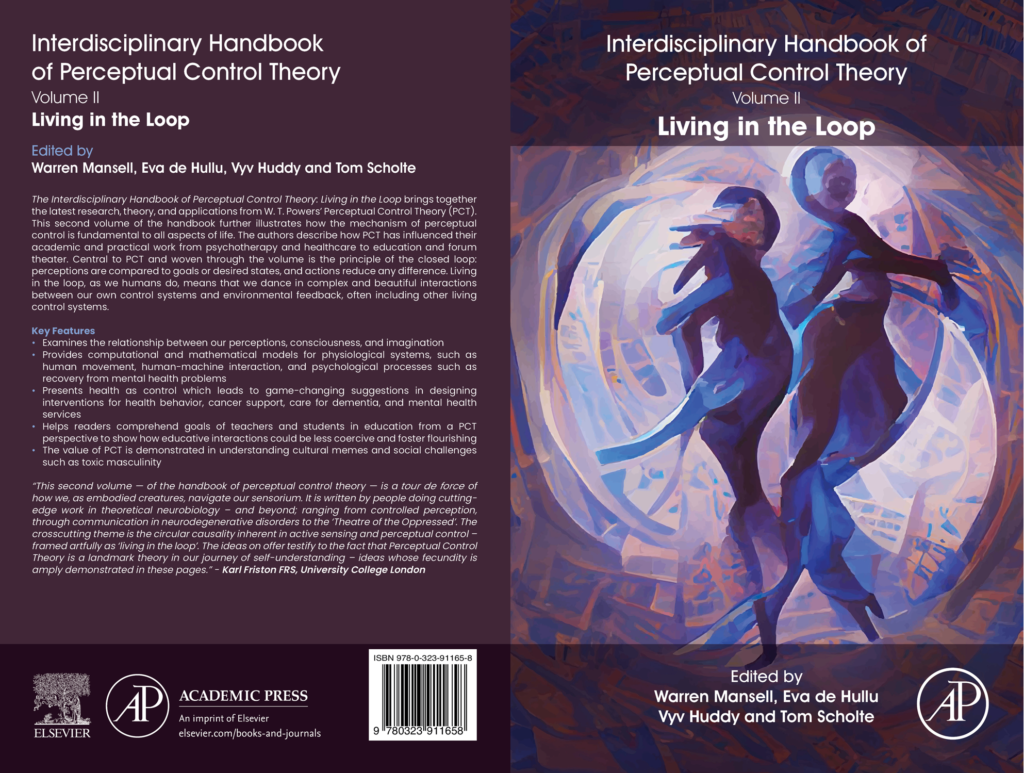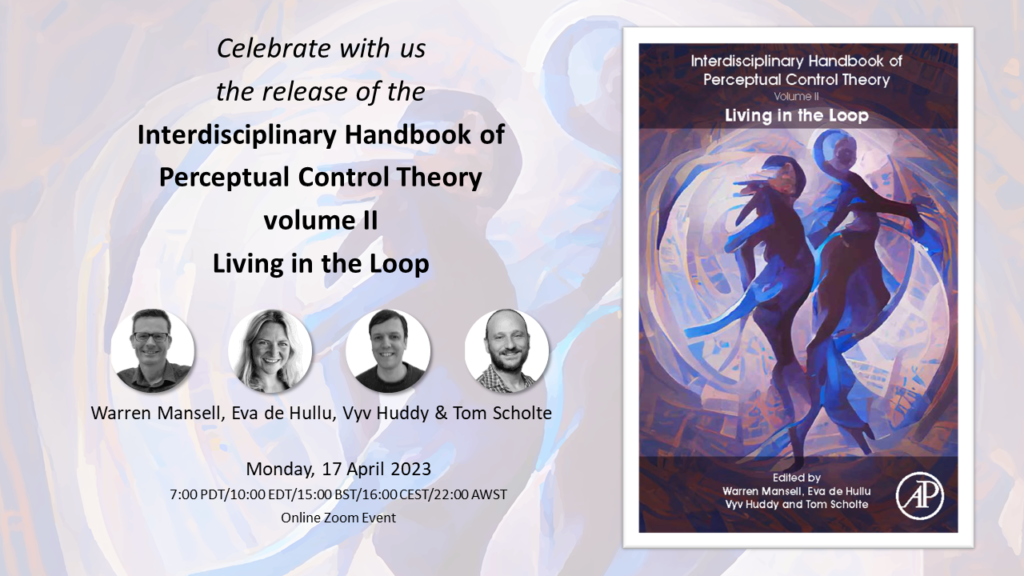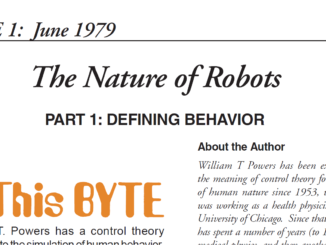
Editors: Warren Mansell, Eva de Hullu, Vyv Huddy, Tom Scholte
Mansell, W., de Hullu, E., Huddy, V., & Scholte, T. (2023). The Interdisciplinary Handbook of Perceptual Control Theory Volume 2: Living in the Loop. Elsevier.
Paperback ISBN: 9780323911658 for sale at Elsevier or through other sellers.
View and purchase chapters at Sciencedirect.
Preface: a contemporary introduction to Perceptual Control Theory.
Mansell, W., de Hullu, E., Huddy, V., & Scholte, T. (Eds.). (2023). Preface. In The Interdisciplinary Handbook of Perceptual Control Theory, Volume II (pp. xxix–xlv). Academic Press. https://doi.org/10.1016/B978-0-323-91165-8.10000-9.
Open access at Sciencedirect
Kindly recorded on audio by Michael Landman (50 minutes).
Launch Event


Recorded session (pass code: H2*W5mx#) of the Book Launch, April 17th, 2023.
Contents
- SECTION 1: Perception, Consciousness, and Imagination
- Exploring the Perceptual Control Hierarchy – Eva de Hullu
- “Conflict to Collage”: A Perceptual Control Theory Architecture to Underpin Human
Consciousness – Warren Mansell - Loss and Restoration of Control: A Perceptual Control Theory Perspective on the Role of Mental
Simulation – Vyv Huddy and Warren Mansell
- SECTION 2: Computational and Mathematical Modeling
- Motor Control as the Control of Perception – Maximilian Gregory Parker
- Perceptual Control Theory Multiple Agent Interaction: A Classical Control Theory Treatment –
Philip S. E. Farrell - Learning Curves and Psychological Change Across Populations: The Implications of
Reorganization – Vyv Huddy
- SECTION 3: Health Applications
- Connecting Perceptual Control theory with Health Behavior – Jonathan Sigger
- Cancer and Control – Mike Rennoldson
- Designing Mental Health Services that are Fit for Purpose Using the Principles of Perceptual
Control Theory – Robert Griffiths - Communication in Dementia: The Development of a New Understanding and Training
Intervention that is Informed by Perceptual Control Theory – Phil McEvoy and Lydia Morris
- SECTION 4: Schooling and Education
- Creating Connected Schools – Shelley A.W. Roy
- PCT and Philosophy of Education: Education as Guidance of Reorganization – Eetu Pikkarainen
- SECTION 5: The Self and Society
- Human Culture Is Based on Mechanisms of Perceptual Control – Ted Cloak
- Sources and Dynamics of the Self: Perceptual Control Theory, Psychoanalysis, and the Control
of Self-Image – Brian D’Agostino - Reorganization as Anti-Oppression: PCT, the Method of Levels, and the Theatre of the
Oppressed – Tom Scholte
- SECTION 6: Synthesis
- Synthesis: Living in the Loop – Tom Scholte, Eva de Hullu, Vyv Huddy, and Warren Mansell
Endorsements
“This second volume — of the handbook of perceptual control theory — is a tour de force of how we, as embodied creatures, navigate our sensorium. It is written by people doing cuttingedge work in theoretical neurobiology – and beyond; ranging from controlled perception, through communication in neurodegenerative disorders to the ‘Theatre of the Oppressed’. The crosscutting theme is the circular causality inherent in active sensing and perceptual control–framed artfully as ‘living in the loop’. The ideas on offer testify to the fact that Perceptual Control Theory is a landmark theory in our journey of self-understanding – ideas whose fecundity is amply demonstrated in these pages.” –
Karl Friston FRS, University College London
Dr. Rutger Goekoop, MD, PhD, Psychiatrist, Free University Amsterdam Department of Behavioral
“It is a wonderful overview of the current state of affairs in the field and a just tribute to the founding father of PCT, William (Bill) Powers. This book is a must-read for anyone willing to gain a better understanding of hierarchical (perceptual) control theory and its ramifications to a wide range of scientific fields, varying from the physical sciences and engineering to clinical medicine and the humanities. The appearance of this book is very timely, as we dive further into an age that appears to be in a dire need for gentle hierarchical control.”
and Movement Sciences; Parnassia Academy, PsyQ, The Hague, Department of Anxiety disorders,
Early Detection and Intervention Team (psychosis)
Mick Cooper, Professor of Counselling Psychology, University of Roehampton
“In this second volume of a much-needed handbook, the authors break ground in developing and extending perceptual control theory, showing its application to a range of fields, including health behaviours, mental health service provision, and education. A rich, in-depth, and stimulating collection of papers that are an essential resource for those interested in this cutting edge perspective on human experiencing and behaviour.”



